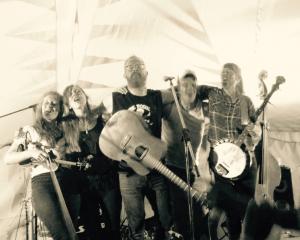When Shayne Carter toured the US with Dimmer in 2007 it was the first time he'd been back to play since his old band the Straitjacket Fits were there in the early '90s with high hopes of making it big.
It never worked out for the Fits.
There were record-company issues, the world was gripped by the grunge music revolution and didn't really care about a little Kiwi band from Dunedin, and the fraught relationship between Carter and the band's other songwriter Andrew Brough didn't help either.
The band eventually split up in 1994 and Carter started Dimmer soon after.
But being back on the road in the US throughout 2007 and 2008, Carter was amazed to came across devout Straitjacket Fits fans (who weren't Kiwis).
"In New Zealand you can forget about the outside world. But it was really great to go over there and realise there are a whole bunch of people who know my music. I'd completely forgotten about that.
"I just kept coming across fans and that was really gratifying."
These people Carter met were fans of his more twisted, less-commercial songs, which are also his favourite tracks.
So with this sentiment in mind and a more adventurous edge he set about writing and recording the fourth Dimmer album, Degrees Of Existence, which comes out on Monday.
"This record is a bit more up, and even though they are still pop songs, I didn't want it to be safe. I wanted to be brave and try some s***," he says, in between sips of orange juice at a Sandringham Rd, Auckland cafe near where he lives.
Compared with Dimmer's previous album, There My Dear, which was a Marvin Gaye-inspired soul record, and 2004's accessible and breezy You've Got To Hear the Music, Degrees of Existence is more challenging.
It's closest to Dimmer's stark and atmospheric 2001 debut, I Believe You Are A Star, and has moments - as on Analogue Real To Real - akin to Straitjacket Fits' classic 1990 album Melt.
There's the muscular and tense title track, the dark throbbing instrumental, Wrong Bus, which recalls the menace of Dimmer's first single, Crystalator, from 1996, and on the lighter flip side are tracks like Too Far Gone To Care with beautiful boy-girl vocals.
"But you know," he grins cheekily, "I couldn't help myself and a couple of desolate lonely guy tracks still made it onto the album. That's my natural inclination."
Another reason the album sounds "tougher", as Carter also describes it, is because the band line-up of guitarist James Duncan, bass player Kelly Steven, and drummer Dino Karlis has been solid for two years - a long time considering the revolving-door policy of the band in the past.
"Ultimately it's still my baby but I don't want to play with people who are just happy to be there.
"I've always been conscious that the musicians I bring in are people I'm confident can add another dimension to the music without me having to spell it out for them.
"I respect strong personalities and I like people to have an opinion - otherwise you may as well play with parrots."
In the past, Carter, who along with the rest of the Straitjacket Fits won the NZ Herald Legacy Award at the Music Awards last year, has been perceived as a bit of a brooding grump.
The last time I interviewed him about Dimmer was in 2004 for You've Got To Hear The Music, and although he wasn't rude he was adamant back then that, "I don't want to talk about my life, mate."
He also used the word "miserablist" during that interview.
He laughs about his negative creep attitude these days and while he's more carefree he's still guarded about giving any great insight into his personal life.
But where is Carter's life at now?
"I'm big enough and ugly enough to be pretty comfortable in my own skin," he offers.
"You know, the best thing about getting older is that what other people think counts for less and less.
So yeah, I guess I feel pretty comfortable where I'm at, mate.
"And creatively I don't really care what other people think. I've always been really mindful of that anyway and with all my music it's never fitted in anywhere. I'm proud of that. I just want to stay true to my own muse and write songs that I can connect with."
He's even elusive when talking about specific songs, like last track What Would I Do, where he asks "Where would I be without you to look over me?".
"It can be about a controlling person in a relationship, or it can be about anyone who seeks to control you.
So it can be personal but also a political and wider social meaning," he laughs, glossing over any specifics of who he's talking about.
He's more open about discussing the politically-motivated Bless, which he came up with after developing a "really sad obsession" watching coverage of the American presidential campaign on the right-leaning Fox network.
"I don't really write many political tunes. I'm not into sloganeering, but I was fascinated to watch it to see how they spun s*** that I'd seen with my own eyes. How they twist it around to suit their means.
"But really it's just a song about colonisation, the fact those people have got the right to go round the world and foist their politics and religion on people with no respect for them. We can bring that to here, Iraq, or wherever."
Carter is fascinated by the mechanics of music, the mystery of it, and how it makes you feel.
He doesn't mind admitting he thinks a lot about deep-and-meaningful songwriting questions like: why do the harmonies of the Beatles appeal to little kids? Or, verging even closer to music-geek territory, why does that chord make me feel the way it does?"To me, music's this great mystery that I'm never going to solve," he says.
"So much of life can be mundane and music is one of the few transcendent things in life. I love how music can articulate the inexplicable and without being profound or pseudo-poetic, that's the magic I try to stay connected to."












